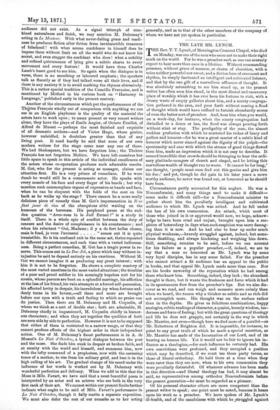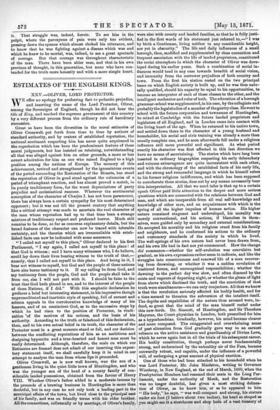THE LATE MR. LYNCH.
MHE Rev. T. T. Lynch, of Mornington Crescent Chapel, who died on Monday, was one of the men who seem not to make their right
mark on the world. For he was a preacher such as one can scarcely expect to hear more than once in a lifetime. Without commanding presence, without grace of manner, or charm of elocution, with a voice neither powerful nor sweet, and a diction bare of ornament and rhythm, he simply fascinated an intelligent and cultivated listener, and that by the one gift of a marvellous affluence of thought. It was absolutely astonishing to see him stand up, as the present writer has often seen him stand, in the most dismal and unsavoury place of worship which it has ever been his fortune to visit, with a dreary waste of empty galleries about him, and a scanty congrega- tion gathered in the area, and pour forth without ceasing a flood of thought which would have sufficed to furnish abundantly scores of even the better sort of preacher. And, hear him when you would, on a week-day, for instance, when the scanty congregation had dwindled to a dozen or less, the flood was always pouring forth without stint or stay. The prodigality of the plan, the almost reckless profusion with which he scattered his riches of fancy and pathos and humour—for he was a great master of a subtle kind of humour which never sinned against the dignity of the pulpit—the spontaneity and ease with which the stream of good things flowed from him, made an impression which it is not easy to describe. It seemed incredible that crowds should be thronging to hear the ordi- nary platitude-mongers of church and chapel, and be letting this marvellous wealth of thought run to waste. 'It cannot be for long,' one thought, people must soon find out this genius and give him his due;' and yet, though he did gain in his later years a more worthy audience, he never was found out, or honoured as he should have been.
Circumstances partly accounted for this neglect. He was a Nonconformist, and many things used to make it difficult— some make it difficult still—for a Nonconformist minister to gather about him the peculiarly intelligent and cultivated audience to which Mr. Lynch was suited. And he fell uncles the ban of his own communion. An attack, which moat of those who joined in it or approved would now, we hope, acknow- ledge to have been cruel and unjust, brought upon him a sus- picion of heterodoxy in days when such suspicion was more damag- ing than it is now. And he had also to bear up under much physical weakness,—bravely struggled against, indeed, but some- times disabling, and always hindering and weighing him down. Still, something remains to be said, before we can account for his failure as a popular preacher,—if, indeed, we are to say that a man so honoured as Mr. Lynch was by some very loyal disciples, has in any sense failed. For the preacher who cannot attract a fit audience has an appeal to the public in books, and that appeal Mr. Lynch made more than once. Nor are his books unworthy of the reputation which he had among those who knew him. Something, indeed, they lack ; the abundant thought is there, but it wants the freshness and force which it had in its spontaneous flow from the preacher's lips. But we also dis- cover as we read, and can weigh and measure more calmly than when we heard, the reason why a thinker so subtle and so rich did not accomplish more. His thought was on the surface rather than in the depths. He gives us felicitous combinations, happy analogies, subtle readings of character, a quaint, homely wisdom, ten- derness and force of feeling; but with the great questions of theology and life he does not grapple, not certainly in the way in which Mr. Maurice, not even—though here we find more of a parallel—as Mr. Robertson of Brighton did. It is impossible, for instance, to point to any great truth of which he made a special assertion, as Mr. Maurice has made of the Incarnation of our Lord, and of its bearing on human life. Yet it would not be fair to ignore his in- fluence as a theologian,—for such influence he certainly had. His own convictions were profound, and they occupied a position which may be described, if we must use these party terms, an those of liberal orthodoxy. He held them at a time when they were rarer than they are now, when to his own communion they were peculiarly distasteful. Of whatever advance has been made in this direction—and liberal theology has had, it may almost be said, no representatives among orthodox Nonconformists before the present generation—he must be regarded as a pioneer.
Of his personal character others are more competent than the present writer to speak ; one point must be noted, because it bears upon his work as a preacher. We have spoken of Mr. Lynch's ill-health, and of the manfubmss with which he ,struggled against
it. That struggle was, indeed, heroic. To see him in the pulpit, where the paroxysms of pain were only too evident, pressing down the spasms which almost choked his utterance, and to know that he was fighting against a disease which was and which he knew to be mortal, was, indeed, to see a great spectacle of courage. But that courage was throughout characteristic of the man. There have been abler men, and that in his own province of thought, in this generation, but none who have con- tended for the truth more honestly and with a more simple heart.



































 Previous page
Previous page